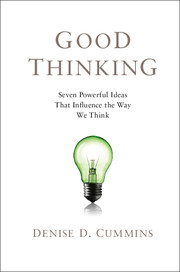Three - Rational Choice
Choosing What is Most Likely to Give You What You Want
Published online by Cambridge University Press: 05 June 2012
Summary
In his 2002 book, Calculated Risks, Gerd Gigerenzer reports the case of a doctor who convinced 90 “high-risk” women without cancer to sacrifice their breasts “in a heroic exchange for the certainty of saving their lives and protecting their loved ones from suffering and loss.” But as Gigerenzer points out, if the doctor had done the calculations correctly, he would have found that the vast majority of these women (84 out of 90, to be exact) were not expected to develop breast cancer at all. Now here is a question: Recently, the American Medical Association changed the rules concerning screenings for breast cancer and prostate cancer, claiming that frequent testing returned too many false positives (test results saying cancer was present when it was not). They recommended less frequent testing. And the outcry among patients was deafening. Television pundits claimed that the decision was driven solely by a desire to reduce medical costs and that this meant the medical profession was willing to sacrifice lives in an effort to save money. Was this decision medically motivated, financially motivated, or (as in the preceding example of the “heroic” doctor) just another case of misguided reasoning? This chapter will help you decide.
How the “Big Boys” Think about Decision Making
The concept of a rational agent is the cornerstone of classic decision theory. But what the average person means by “rational” is not necessarily the same thing an economist means. You may describe people as rational if their thinking is calm, logical, and coherent. To an economist, rational agents are first and foremost self-interested – that is, they compare choices and select those that maximize their own benefits and minimize their own costs.
- Type
- Chapter
- Information
- Good ThinkingSeven Powerful Ideas That Influence the Way We Think, pp. 31 - 58Publisher: Cambridge University PressPrint publication year: 2012



